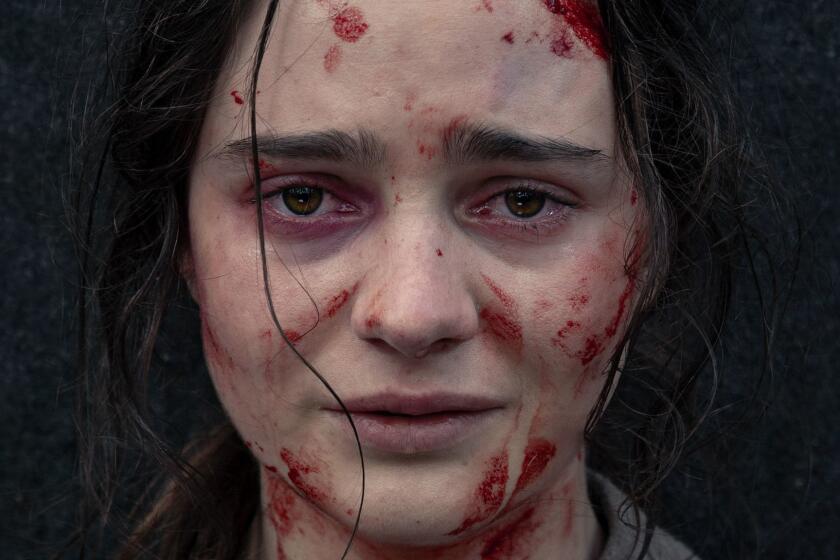Review: Jennifer Kent’s ‘The Nightingale’ is a brilliant, horrifying tale of revenge
- Share via
In “The Nightingale,” an infuriating, devastating saga of retribution and survival from the Australian writer-director Jennifer Kent, the horrors of European colonialism are etched into every frame. We are in 19th century Tasmania, then known as Van Diemen’s Land, in the early days of a conflict that wiped out most of the island’s indigenous population. Against a wilderness backdrop of astonishing violence, an Irish-born woman named Clare (Aisling Franciosi) and an Aboriginal man named Billy (Baykali Ganambarr) are forced into this movie’s harsh and unforgiving spotlight, forging an uneasy alliance in the pursuit of justice.
It is justice that has ostensibly brought Clare to this small penal colony in the first place. Exiled after being convicted of petty theft seven years ago in her native Ireland, she has more than served her time under the cold, lascivious eye of a British lieutenant, Hawkins (Sam Claflin). Calling her his “nightingale” on account of her lovely voice, he forces her to sing sweet songs for his colleagues every night, then rapes her behind closed doors. Clare has a loving husband, a fellow convict named Aidan (Michael Sheasby) and an infant child, but Hawkins views her as his property — and he doesn’t respond kindly when that property tries to wriggle out of his grasp.
The opening scenes of “The Nightingale,” in which Clare loses everything and nearly loses her life, are almost unbearable in their brutality. (I can’t recall the last time the press materials for a movie came with a trigger warning.) Shooting in the nearly square Academy aspect ratio, Kent and her cinematographer, Radek Ladczuk, turn human faces into landscapes of pain. They let this early tragedy play out in a series of candlelit closeups, suggesting not just a dramatization but an overwhelming confrontation with evil.
But if you make it through the first half-hour, you may find yourself hard-pressed to abandon your seat until the movie’s conclusion. “The Nightingale” isn’t just a revenge thriller; with tremendous urgency and blunt, searing power, it builds an immediate case for the emotional and moral necessity of its heroine’s actions. When we see Clare the morning after her horrific ordeal, the remarkable Franciosi signals that she has undergone a kind of spiritual if not physical death: The warmth and light has gone out of her eyes, leaving only a cold, pitiless desire for blood.
Times film critic Justin Chang is keeping a regular diary over the course of a week at the 2019 Sundance Film Festival.
But her enemy is nowhere to be found. Frustrated in his current post, Hawkins has left for the town of Launceston with two underlings (Damon Herriman and Harry Greenwood) to apply in person for a new position, even though he has already been effectively rejected. The movie shows us Hawkins’ professional failures not to complicate our feelings toward him — there is no chance of that — but rather to suggest his banality, the transparent mediocrity that lurks behind his moral void. (In this he suggests a far nastier version of the exiled Spanish official in Lucrecia Martel’s “Zama,” another remarkable anti-imperialist epic.) Claflin, in a courageously loathsome performance, doesn’t just play a man prone to mindless acts of violence; he puts a smug face on the colonialist experiment, giving flesh to its senseless, predatory horror.
Clare swiftly plunges into the wilderness after him, though not before hiring the reluctant, resourceful Billy to guide her over miles of treacherous terrain. It’s a protective measure with risks of its own: A white woman and a black man are bound to attract even more unwanted attention traveling together than they would apart. But Clare’s determination gives her no time for caution or niceties, especially where Billy is concerned: She barks orders at him and calls him “boy,” asserting her authority in much the same way Hawkins would.
Which is not to suggest that “The Nightingale” draws a moral equivalency between the two: Clare is very much the heroine of her story and, like Billy, a slave of the British Empire. But she is also a player in his story, and her role in that narrative may be that of an oppressor as well as an ally, a point that becomes both clearer and murkier the deeper into the forest they go. Here in a primitive wilderness despoiled by European invaders, where black men and women are rounded up, murdered and hanged from trees, a much farther-reaching tragedy comes into startling focus.
Ganambarr, an indigenous Australian dancer making his screen acting debut, won a prize at last year’s Venice International Film Festival for his sly, spirited performance, which reshapes the picture in ways both obvious and not. Billy is an excellent guide, calling on both practical sense and deep local knowledge to ensure their survival. But his most significant achievement may be to challenge and recontextualize Clare, to call her own moral and narrative standing into question. “The Nightingale” isn’t one of those complacent movies that deigns to view black suffering through a white outsider’s lens. It’s about a damnably complex situation in which guilt and grief blur and barbarism has a way of breeding complicity even among the presumed innocent.
This is stunningly grim material even for Kent, who came to international prominence with her masterful 2014 horror film, “The Babadook.” In that movie, a shattering study of grief in the guise of a haunted-house chiller, she invested a storybook boogeyman with real metaphoric grandeur. The phantoms she excavates in “The Nightingale” are of a decidedly different, more politically complicated breed: They hail not from her imagination but from history, and they cast long and terrible shadows over a present still eternally grappling with hideous legacies of bigotry, oppression and genocide.
They also place this picture in conversation with a long-standing Hollywood tradition of revenge-themed survival cinema: The rapport between Clare and Billy inevitably recalls “True Grit,” while the blood-and-mud realism of their struggle, punctuated by occasional flashes of nightmarish surrealism, suggests a less pretentiously inflated version of “The Revenant.” Kent handles the grueling physical demands of the production with utter assurance. She doesn’t just capture the visceral terror of a spear suddenly piercing a man’s flesh; she’s also attuned to quieter, more incidental terrors — the fear in the eyes of an orphan boy being groomed in Hawkins’ ghastly image or the stricken gaze of an indigenous woman who knows the fate that awaits her.
The story’s gradually expanding window on injustice inevitably costs it some drive and focus in the final stretch. In ways both fascinating and frustrating, it’s when Clare and Billy draw closer to Launceston and their inevitable showdown with Hawkins and his men that “The Nightingale’s” conviction seems to falter, as though the movie were second-guessing its chosen path. Clare’s thirst for revenge begins to waver as the full weight of her trauma, and of the other traumas she’s witnessed, finally sinks in.
In the end, a measure of balance is restored, but Kent is too honest to suggest this respite will be anything but temporary. The conventions of the revenge thriller are somehow both cannily fulfilled and skillfully subverted, but “The Nightingale” has more on its mind than an exercise in genre. This is a profound and difficult film, an attempt to grapple with the existence and mindless perpetuation of evil, and to suggest both the fleeting satisfaction and the eternal futility of vengeance. Nothing about it is easy, and everything it shows us matters.
------------
‘The Nightingale’
(In English, Irish Gaelic and Palawa kani with English subtitles)
Rating: R, for strong violent and disturbing content including rape, language throughout and brief sexuality
Running time: 2 hours, 16 minutes
Playing: Starts Friday at ArcLight Cinemas, Hollywood
More to Read
Only good movies
Get the Indie Focus newsletter, Mark Olsen's weekly guide to the world of cinema.
You may occasionally receive promotional content from the Los Angeles Times.












